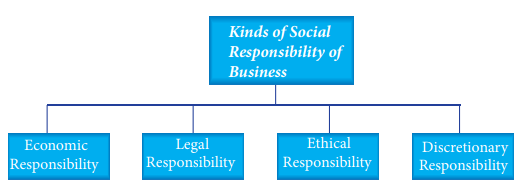Chapter: 11th Commerce : Chapter 17 : Social Responsibility of Business and Business Ethics
Arguments for and Against social responsibility
Arguments for social responsibility
The rationale for assuming social
responsibility lies in the following arguments;
1. Protection of Stakeholders Interest
A business organisation is a coalition
of several interest groups or stakeholders. Example – shareholders, customers,
employees, suppliers, etc. Business should, therefore, work for the interest of
all of them rather than for the benefit of shareholders / owners alone.
2. Promotion of Society
Business is a sub-system of society. It
draws support and sustenance from society in the form of inputs. Socially
responsible behaviour is essential to sustain this relationship between
business and society.
3. Assessment of Social Impact
During the course of its functioning, a
business enterprise makes several decisions and actions. Its activities
exercise a strong influence on the interests and values of society. Business
must fulfil social obligations as a compensation for undermining the legitimate
interests of society.
4. Organised Social Power
Large corporations have acquired
tremendous social power through their multifarious operations. Social
power may be misused
in the absence
of social responsibility. There
should be a equilibrium between social power and social responsibility.
5. Legitimacy
It is in the enlightened self-interest
of business to assume social responsibility. Social responsibility legitimises
and promotes the economic objectives of business. By improving social life,
business can obtain better customers, employees and neighbours. Social
responsibility thus builds good citizenship as well as good business.
6. Competence
Business organisations and their
managers have proved their competence and leadership in solving economic
problems. Society expects them to use their competence to solve social problems
and thereby play a leadership role.
7. Professional Conduct
Professional managers are required to
display a keen social sensitivity and serve the society as a whole. Social
responsibility is one of the professional demands on managers. They adhere to
the code of conduct and ethics applicable to respective area of operation.
8. Public Opinion
Adoption of social responsibility as an objective will help to improve the public opinion of business. A good public image is a valuable asset for business. For example maintaining parks, traffic islands and organising awareness camps etc.,
Arguments Against Social Responsibilitly
Critics of the social responsibility
concept put forward the following arguments:
1. Lack of Conceptual Clarity
The concept of Social responsibility
is very vague and amenable to different
interpretations. There is no consensus on its meaning and scope. In such a
situation, it would be futile as well as risky to accept social responsibility.
2. Dilution of Economic Goals
By accepting social responsibility,
business will compromise with economic goals. Business is an economic
institution and its only responsibility is to make maximum possible profits for
its owners. It would endanger its economic viability by accepting any other
responsibility.
3. Lack of Social Skill
Business organisations and their
managers are not familiar with social affairs. There are special social service
organisations such as Government and Non-Governmental Agencies which can better
deal with social problems.
4. Burden on Consumers
If business deals with social problems,
cost of doing business would increase. These costs will be passed on to
consumers in the form of higher prices or will have to be borne by owners. This
would lead to taxation without representation.
5. Responsibility without Power
Business organisations possess only
economic power and not social power.
It is unjust to impose social
responsibilities with social power. If business is allowed to intervene in
social affairs it may perpetuate its own value system to the detriment of
society.
6. Misuse of Responsibilities
Acceptance of social responsibilities
will involve diversion of precious managerial time and talent on social action
programmes. It may result in dilution of valuable corporate resources.

7. Lack of Yard-stick
Profitability is the common criteria for
decision-making in business. Tampering it with social responsibility would make
the decision-making process quite complex and controversial.
8. Improper Role
The proper role of business is to use
its resources and energies efficiently so as to earn the best possible return
on investment within the confines of law and ethics. Business should
concentrate on economic performance leaving social service to other
organisations.
9. Over Loading Responsibility
Business organisations are already
serving society by providing goods and services, generating employment,
developing technology and contributing to public exchequer through tax
payments. It would be unjust to overburden them with further responsibilities.
Related Topics